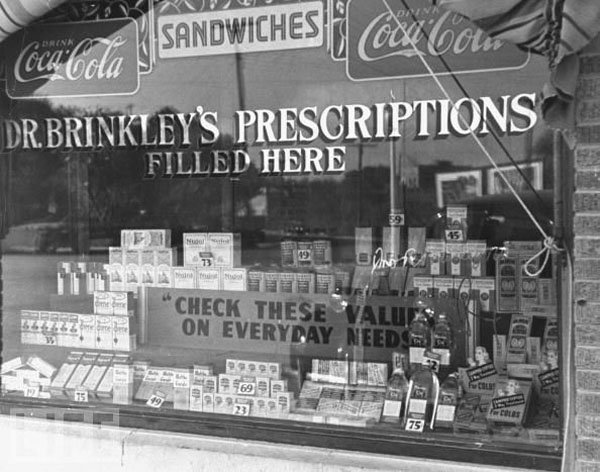John R Brinkley, the Border-Blasting Charlatan
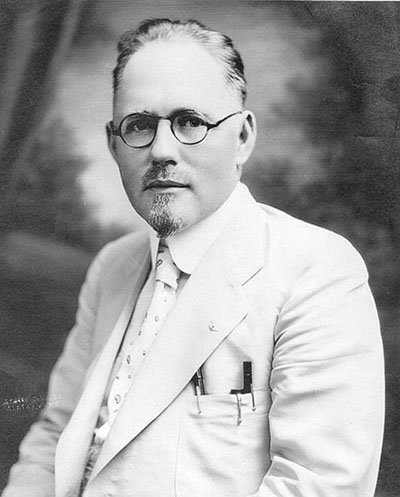 John Romulus Brinkley was born on July 8th 1885 of somewhat complicated parentage. His father was John Richard, a former medic in the Confederate army. His mother was Sarah Burnett, the niece of John Richard’s fourth wife, Sally. Brinkley’s mother died when he was five, and his father when he was ten, leaving him to be raised by his “Aunt Sally”. The family lived in Jackson County, North Carolina, and young Brinkley received a basic education – though he dreamed of studying medicine and becoming a real doctor (following in his father’s footsteps, though the elder Brinkley had never been formally qualified). At the age of 16 he was forced to leave school and go to work, first as a mailman and then as a telegrapher. In this job he moved to New York and then New Jersey, but at the age of 21 he was brought home on a sad errand, as Aunt Sally had died. Back in Jackson county he met an old school friend, a woman named Sally Wilke. The two hit it off quickly, and just over a month after Aunt Sally’s death, on January 27th 1907, they were married. It may have been Sally Wilke who first pointed out to Brinkley that there was, at the time, more than one route into the medical profession.
John Romulus Brinkley was born on July 8th 1885 of somewhat complicated parentage. His father was John Richard, a former medic in the Confederate army. His mother was Sarah Burnett, the niece of John Richard’s fourth wife, Sally. Brinkley’s mother died when he was five, and his father when he was ten, leaving him to be raised by his “Aunt Sally”. The family lived in Jackson County, North Carolina, and young Brinkley received a basic education – though he dreamed of studying medicine and becoming a real doctor (following in his father’s footsteps, though the elder Brinkley had never been formally qualified). At the age of 16 he was forced to leave school and go to work, first as a mailman and then as a telegrapher. In this job he moved to New York and then New Jersey, but at the age of 21 he was brought home on a sad errand, as Aunt Sally had died. Back in Jackson county he met an old school friend, a woman named Sally Wilke. The two hit it off quickly, and just over a month after Aunt Sally’s death, on January 27th 1907, they were married. It may have been Sally Wilke who first pointed out to Brinkley that there was, at the time, more than one route into the medical profession.
Quite when John R Brinkley entered the charlatan’s trade is somewhat hard to pin down. Some sources claim that he and Sally began travelling around posing as Quaker doctors and selling patent medicine. Others say that he moved to Knoxville, Tennessee, working as the right hand man of an already established snake oil salesman named Burke. By November the couple settled in Chicago where their first child was born, a daughter named Wanda. Brinkley enrolled at Bennett Medical College, an unaccredited school that taught “eclectic medicine”. This meant a curriculum that combined folk remedies and solid medical practises. Eclectic schools had gained a good reputation during the previous century, as their utilitarian approach had led them to (correctly) discard mainstream medicine’s obsession with bleeding patients and administering purgatives. By the 20th century places such as Bennett had been left behind. This did mean that they were cheap, which was probably the deciding factor in Brinkley’s attendance. Working nightshifts as a telegrapher for Western Union and studying during the day meant that he earned enough to completely fail to cover the costs of his tuition. It was this financial issue that would destroy his marriage.
Sally began to regard Brinkley’s quest for medical credentials as a foolish obsession, and when he started working double shifts at Western Union to cover the costs she decided enough was enough. She left him, filing for divorce and demanding child support. Brinkley responded in the obvious fashion – he kidnapped Wanda and fled to Canada. When Sally was unable to have him extradited she dropped her demand for child support, and he returned to Chicago. She left him again (while pregnant with another daughter) in 1911, while he was in his third year of study. Brinkley reluctantly abandoned his studies and moved back to North Carolina, where Sally had gone. There he was unable to gain entrance to any accredited colleges, as Bennett would not forward on his credentials unless he paid his debt to them. Still, he persisted in practising medicine as an undergraduate physician. Having had enough, Sally gave him an ultimatum – her and his daughters, or the medical career. Brinkley opted for the latter, and the two split up for the final time.
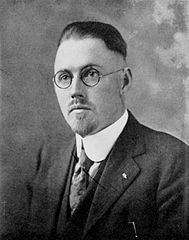
Brinkley set up shop in Greenville, South Carolina, establishing an “Electro Medicine” business with a man named Crawford. The two men made a living injecting local farmers with coloured water and telling them it was “electric medicine from Germany”. Brinkley became involved with a young woman named Minne Jones, the daughter of a local doctor, and in August 1913 (after a courtship that lasted a mere four days) the two were married. Brinkley was, of course, still married to Sally at the time. While on his honeymoon Brinkley was arrested and extradited back to Greenville, where he and Crawford faced charges of practising medicine without a license and of writing bad checks. Brinkley was able to shift the majority of the blame on Crawford and went free. Unfortunately Sally Brinkley had seen the publicity, and confronted Minnie to tell her that Brinkley was a bigamist. From her actions it seems that Minnie didn’t really care. While she did eventually push Brinkley to divorce Sally and remarry her, this seems to have been more based on fear of exposure than any moral qualms. In fact, life began to go well for the two. Brinkley got an undergraduate license to practise medicine and earned enough money to pay off his debt to Bennett, allowing him to enrol in another eclectic school in Kansas and finally get his degree. He spent some time as the doctor in residence at the Swift & Co slaughterhouse in Kansas city, which would later prove highly influential on his career. While Brinkley was called up for military service in 1917, he never actually saw any action as he was discharged after two months. On his return the two moved to the town that would see Brinkley launched on an arc into fame and fortune before collapsing into inevitable disgrace – Milford, Kansas.
1918 was the year of the great Spanish Flu pandemic, the last true global plague. Brinkley’s conscientious treatment of flu victims and the effort he put into treating those who fell sick gained him a good reputation in the town. The following year, in 1919, a momentous event took place. One of his patients, a farmer named Stittsworth, was suffering from impotence. Brinkley reportedly joked that what the man needed were goat testicles to replace his own (he having seen how even in the slaughterhouse the goat’s libido was irrepressible). Stittsworth took his suggestion seriously, and so Brinkley found himself transplanting what he would hereafter refer to as “glands” into the man. At the time the endocrine system and the actions of hormones on the human body were barely understood. Doctors such as Charles-Edouard Brown-Sequard in France had experimented by injecting themselves with crushed animal testicles, later gaining renewed vigour (possibly due to the testosterone content of the injection). Still, the idea that an animal’s testicles could be transplanted into a man and work correctly is flat-out impossible, even before you take into account the microsurgery that would be required to attach them. But, as is often said, the most important sexual organ is the human mind. Stittsworth soon “regained his vigour” and had a son (who he named “Billy”, of course). He was effusive in his testimonials, and Brinkley had a new, highly profitable, sideline.
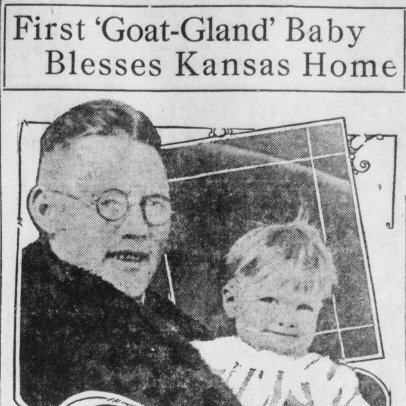
Brinkley hired an advertising agent to spread the news of his amazing new procedure. In an “Emperor’s New Clothes” twist, he claimed that the operation was best suited to work on the intelligent – ensuring that those on whom it failed would not wish to draw attention to themselves. Naturally, several of those he operated on died, but sterile operating procedures were not standard at the time and deaths from operations were common regardless. Over the next few years Brinkley managed to draw a lot of attention, not all of it favourable. The American Medical Association, which was working to stamp out medical quackery at the time, began investigating him, with Morris Fishbein (who was assistant editor of the Journal of the AMA, and would become editor in 1924) taking an especial interest. On the other hand, Brinkley made a powerful ally in the form of Harry Chandler, owner of the LA Times. He procured a special license for Brinkley to operate on him in California, and gave him a great deal of positive coverage. Brinkley’s plans for relocating to California were dashed when the California Medical Board (who had been forewarned by Fishbein of Brinkley’s dubious credentials) refused to grant him a permanent license. He returned to Kansas, but not without a new inspiration.
While Brinkley was in LA, Chandler had taken him on a tour of KHJ, a radio station he owned. In 1923 Brinkley founded his own radio station, KFKB. He chose the callsign as standing for “Kansas First, Kansas Best”, a sentiment the locals heartily endorsed. Brinkley’s chief radio talent was himself, talking about the benefits of his treatment, interspersed with whatever music he found close to hand – an eclectic mix of Hawaiian folk music, gospel songs, and early country records. [1] KFKB became one of the most popular stations in the country and this huge advertising boost led to a great deal of publicity for his clinic in Milford. This made him very successful, with a lot of his profits being put into public works projects – an approach which paid dividends when the state of California issued a warrant for his arrest. There had been a scandal about colleges granting medical degrees without sufficiently rigorous examination, and the Kansas City college where Brinkley had received his was implicated. This lack of a valid degree meant that the temporary license he had been granted for surgery was invalid and he had broken the law by operating on Chandler and others. Brinkley was popular enough that the state of Kansas refused to extradite him, and the charges were never pressed.
Brinkley started a new feature on his show, entitled “Medical Question Box”, in which he would diagnose people’s ailments on air and prescribe treatment. The usual procedure was for him to give them a number to take to their local Brinkley-affiliated pharmacist, who would give them the treatment it corresponded to. Naturally, pharmacies were eager to sign up for the scheme and split the profits with Brinkley, who was soon a rich man off this money. Of course, the patients were usually misdiagnosed and wound up even sicker, which led to him being thoroughly denounced by Fishbein in the Journal of the AMA. The Journal was a trade paper read mainly by doctors, but Brinkley had a rival with a much more potent reach – the Kansas City Star, a major state paper which also ran a radio station. They had enough ammunition to demolish his reputation, and in 1930 the state medical board revoked his license, based on the high number of fatalities from operations at his clinic. (In case we forget, though the goat testicle operation is humorous, it did lead to several hundred avoidable deaths, putting Brinkley with a body count higher than most serial killers.) The same year the Federal Radio Commission refused to renew his license, citing (among other more general faults) that his Medical Question Box was”contrary to the public interest”. Faced with this double setback, Brinkley was forced to the last refuge of the scoundrel. Politics.
The single craziest thing about Brinkley’s run for Governor of Kansas in 1930 was that he was very nearly elected, and indeed possibly should have been elected. He still had his radio station (as his old license had not yet expired), and he used this platform, along with political rallies where he would arrive by airplane, to push himself forward. He made a strong appeal to the German and Swedish immigrant communities, but was undone by two key factors. The first was that he declared his candidacy too late to be on the ballot, forcing him to become a “write-in” candidate. The second was that, in a cynical move sadly typical of American politics, the rules around write-in candidates were changed only days before the election to say that any write-in which did not say “JR Brinkley” exactly would be disqualified. This took out more than 30,000 and 50,000 of Brinkley’s votes, which proved to be enough to lose him the race. He ran again in 1932 and again came close, but failed to win out. By this stage he had been forced to sell KFKB, though the Milford clinic was still running with other doctors (in his employ) carrying out the surgeries. The loss of his radio station left him looking for alternative solutions to regain his publicity machine, and he turned his eyes to Mexico.
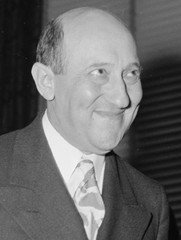
In 1931 Brinkley moved to Del Rio in Texas, a small town whose chief attract lay in being right on the border with Mexico. The Mexican government was deeply unhappy with the Federal Radio Commission, which had failed to consult them before issuing licenses that covered frequencies across the whole of North America, and so despite pressure from the US government they allowed him to build a radio antenna across the border. The new station was named XER-AM, though it was later simply renamed XERA. The station had sufficient power to be heard across the southern USA, making it the first “border blaster” station. [2] Eventually Brinkley upgraded the power of the station to the extent that it could heard as far away as New York, though this extreme power meant that it would overpower other radio stations entirely, and reportedly was powerful enough to be picked up by metal fillings and barbed wire fences, and easily the most powerful radio station in the world XERA continued to follow the same pattern as KFKB had, and it helped to launch the careers of early country music legends like Red Montana and Gene Autry. Brinkley would usually transmit by telephone from within the US, a practice which the US government specifically outlawed in 1934 in what became known as the Brinkley Act. This didn’t stop the doctor – he simply recorded his speeches using a special type of phonograph record known as an acetate disc, which could be played from Mexico with studio sound quality.
By 1938 Brinkley had become a rich man, though competitors had begun to spring up. He was finally undone when Morris Fishbein published an extensive investigation into him as part of a series on “Modern Medical Charlatans”. Brinkley foolishly decided to sue Fishbein for libel, which was a serious mistake as it left the burden of proof on him to demonstrate that the charges were false. This he was unable to do, and the jury officially declared that Brinkley “should be considered a charlatan and a quack in the ordinary, well-understood meaning of those words”. This opened the door for dozens of lawsuits against him, which devastated his fortune. Scenting blood, the IRS also began investigating him for tax fraud. By 1941, he was officially bankrupt. Perhaps as a result of this, his health began to suffer and he had three heart attacks, as well as losing a leg to circulatory disease. In 1942, he died of heart failure.
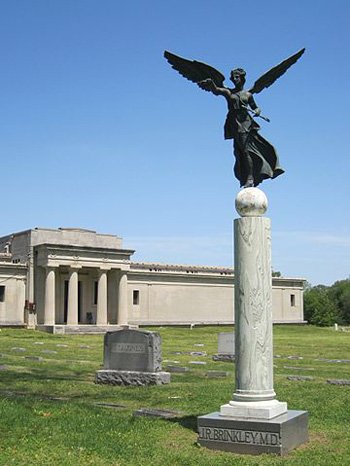
Though he was virtually penniless, enough money remained to see him buried in Memphis, Tennessee (Minnie’s old home town). His tomb’s inscription would have pleased his younger self, though some might question his right to it: “JR BRINKLEY, M.D.” In death, at least, he was finally considered a doctor.
[1] In fact, Brinkley’s musical tastes have been credited with spreading country music throughout the American South, as previously radio stations had mostly played classical music, and other sorts considered to be “uplifting”. One could even credit him with being responsible for the birth of rock and roll, though that might be going a bit too far.
[2] “Border Blasters” in the US are almost exactly analogous to the “pirate radio stations” of the UK which transmitted from ships in international waters to avoid legislation. Radio Luxembourg, which transmitted from the continent to the UK, was similar.

